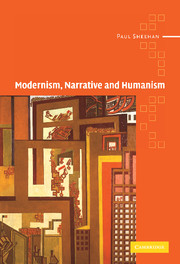Book contents
- Frontmatter
- Contents
- Preface
- Acknowledgments
- Introduction: The anthropometric turn
- 1 Narrating the animal, amputating the soul
- 2 Conrad and technology: homo ex machina
- 3 The Lawrentian transcendent: after the fall
- 4 Woolf's luminance: time out of mind
- 5 Doubting Beckett: voices descant, stories still
- Conclusion: Humanness unbound
- Notes
- Bibliography
- Index
Conclusion: Humanness unbound
Published online by Cambridge University Press: 06 July 2010
- Frontmatter
- Contents
- Preface
- Acknowledgments
- Introduction: The anthropometric turn
- 1 Narrating the animal, amputating the soul
- 2 Conrad and technology: homo ex machina
- 3 The Lawrentian transcendent: after the fall
- 4 Woolf's luminance: time out of mind
- 5 Doubting Beckett: voices descant, stories still
- Conclusion: Humanness unbound
- Notes
- Bibliography
- Index
Summary
[T]he meaning of humanity is not exhausted by the humanists, nor immune to a slippage that is at first imperceptible but can ultimately prove fatal. Is there a fragility to humanity in this humanism? Yes … in spite of all its generosity, Western humanism has never managed to doubt triumph or understand failure or conceive of history in which the vanquished and the persecuted might have some value.
Emmanuel LevinasThe anthropometric era, as I have defined it, covers little more than a hundred years, or from the 1850s to the 1950s. In the late 1850s Darwin's ‘dangerous idea’ took hold of the scientific and lay mind alike, and Schopenhauer's philosophical system, after decades of neglect, began its reign over European letters and European thought generally. At the other end of the period, the 1950s, Beckett's trilogy of prose works appears as a culminating point in literary reflection on the human, situated in a precarious zone between humanist self-aggrandisement and antihumanist censure.
As I have argued, at some time in the middle of the nineteenth century a seismic shift occurred in Western thought, an alteration in how the human was understood. The faultline spread through a number of cultural domains, changing human self-understanding within natural science, technology, philosophy, literature and literary criticism. The chief consequence of this change was that conceptions of the ‘human’ became decoupled from beliefs in ‘humanism’, the one no longer presupposing (or indemnifying) the other.
- Type
- Chapter
- Information
- Modernism, Narrative and Humanism , pp. 180 - 192Publisher: Cambridge University PressPrint publication year: 2002



